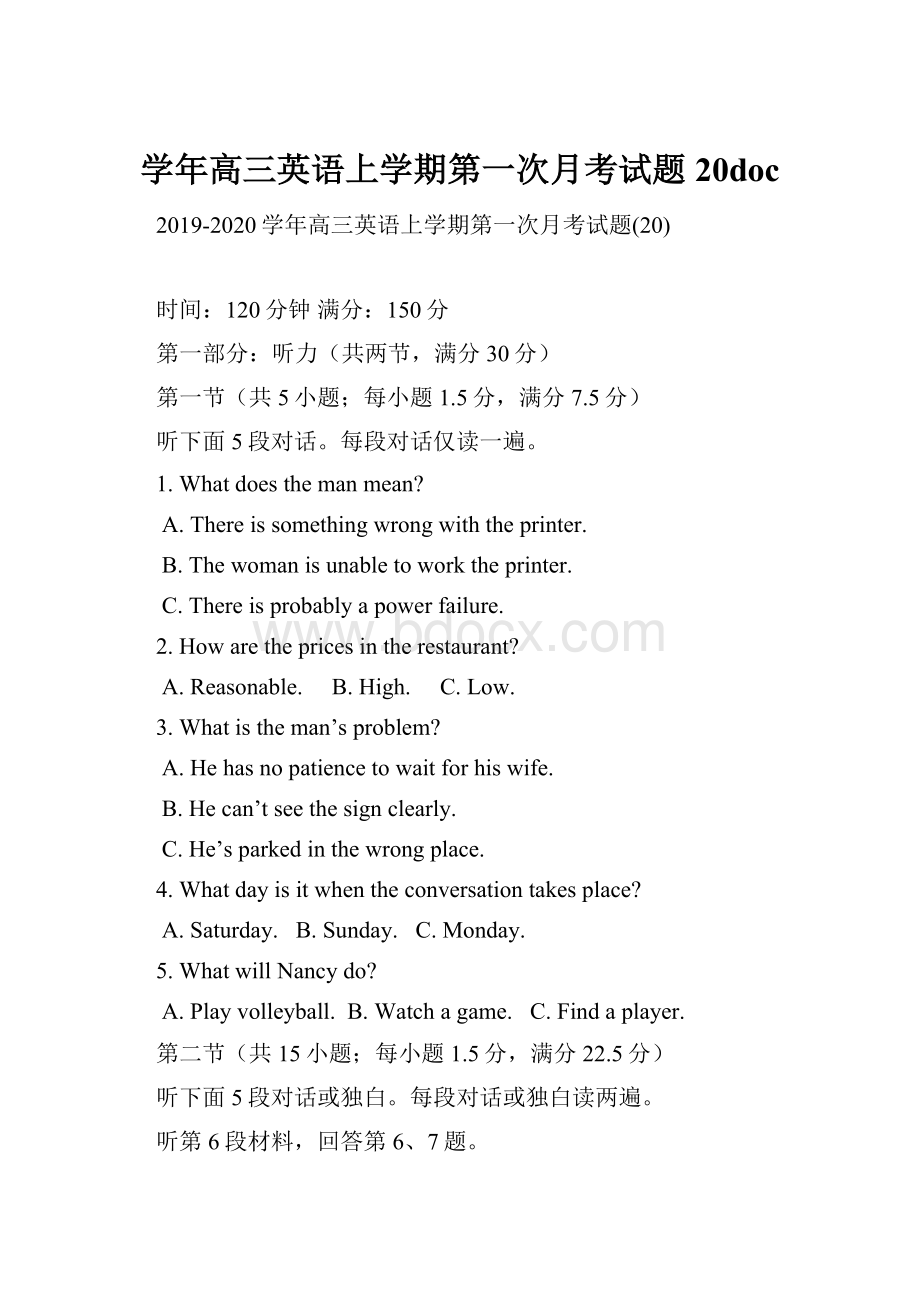学年高三英语上学期第一次月考试题20doc.docx
《学年高三英语上学期第一次月考试题20doc.docx》由会员分享,可在线阅读,更多相关《学年高三英语上学期第一次月考试题20doc.docx(15页珍藏版)》请在冰豆网上搜索。

学年高三英语上学期第一次月考试题20doc
2019-2020学年高三英语上学期第一次月考试题(20)
时间:
120分钟满分:
150分
第一部分:
听力(共两节,满分30分)
第一节(共5小题;每小题1.5分,满分7.5分)
听下面5段对话。
每段对话仅读一遍。
1.Whatdoesthemanmean?
A.Thereissomethingwrongwiththeprinter.
B.Thewomanisunabletoworktheprinter.
C.Thereisprobablyapowerfailure.
2.Howarethepricesintherestaurant?
A.Reasonable.B.High.C.Low.
3.Whatistheman’sproblem?
A.Hehasnopatiencetowaitforhiswife.
B.Hecan’tseethesignclearly.
C.He’sparkedinthewrongplace.
4.Whatdayisitwhentheconversationtakesplace?
A.Saturday.B.Sunday.C.Monday.
5.WhatwillNancydo?
A.Playvolleyball.B.Watchagame.C.Findaplayer.
第二节(共15小题;每小题1.5分,满分22.5分)
听下面5段对话或独白。
每段对话或独白读两遍。
听第6段材料,回答第6、7题。
6.Whatprobablyisthewoman?
A.Abankclerk.B.Apostofficeclerk.C.Ahotelclerk.
7.Howmuchdoesthemanplantoputintheaccounttoday?
A.$100.B.$200.C.$500.
听第7段材料,回答第8、9题。
8.Wheredidthewomanstayduringherholiday?
A.Inahotel.B.Atafarmhouse.C.Attheircamp.
9.Whatkindofweatherdidthewomanhaveduringherholiday?
A.Sunny.B.Rainy.C.Terrible.
听第8段材料,回答第10至12题。
10.Whyisthemanattheshop?
A.Toorderamobilephoneforhiswife.
B.Tohaveamobilephonerepaired.
C.Togetamobilephonechanged.
11.Whatcolourdoesthemanwant?
A.Pink.B.Black.C.Orange.
12.Whatwillthemandoafterwards?
A.Makeaphonecall.B.Waituntilfurthernotice.C.Comeagainthenextday.
听第9段材料,回答第13至16题。
13.What’sthewoman’smajornow?
A.Hotelmanagement.B.French.C.Computerscience.
14.Whydidthewomanchangehermajor?
A.Becauseshereceivedafour-yearacademicscholarship.
B.Becauseshewantedtofindajobmoreeasilylater.
C.BecauseshewantedtomajorinFrenchatfirst.
15.Howdoesthewomanpayforcollege?
A.Withthemoneyfromherparents.
B.Withanacademicscholarship.
C.Bydoingapart-timejob.
16.Whatcanbelearntabouttheman’spart-timejob?
A.Hisfellowworkersarefriendly,butthepayisbad.
B.Heworksthreetimesaweekatacampus.
C.Heworksatarestaurantandispaidwell.
听第10段材料,回答第17至20题。
17.What’sthepurposeofthetalk?
A.Offeringsomeadviceonsleepingproblems.
B.Tellingpeoplehowtoexercise.
C.Stressingphysicalexercise.
18.Whyisituselesstokeepturningaroundwhenyoucan’tsleep?
A.Itincreasesheartrate.B.Itmakesyouworry.C.It’stiring.
19.Whichofthefollowingcancausesleeplessness?
A.Eatingcheesebeforeyougotobed.
B.Lackofsleeponweekends.
C.Toomuchexerciseintheevening.
20.Whatcanwelearnaboutsleepingpills?
A.Theyworkwell.B.Theyworsensleeping.C.Theyhelprelax.
第二部分阅读理解(共两节,满分40分)
第一节(共15小题;每小题2分,满分30分)
阅读下列短文,从每题所给的四个选项(A、B、C和D)中,选出最佳选项。
A
TheNobelPrizeWinnersinLiterature
RabindranathTagore(1913)
Prizemotivation:
"becauseofhisdeepsensitive,freshandbeautifulpoetry,withperfectskill,hehasmadehispoeticthought,expressedinhisownEnglishwords,apartoftheliteratureoftheWest"
WilliamFaulkner(1949)
Prizemotivation:
"forhispowerfulandartisticallyuniquecontributiontothemodernAmericannovel"
ErnestMillerHemingway(1954)
Prizemotivation:
"forhismasteryoftheartofnarrative,mostrecentlydemonstratedinTheOldManandtheSea"
JohnSteinbeck(1962)
Prizemotivation:
"forhisrealisticandimaginativewritings,combiningastheydosympathetichumourandkeensocialperception"
SirWinstonLeonardSpencerChurchill(1953)
Prizemotivation:
"forhismasteryofhistoricalandbiographicaldescriptionaswellasforbrilliantspeechskillsindefendingnoblehumanvalues"
ClaudeSimon(1985)
Prizemotivation:
"whoinhisnovelcombinesthepoet'sandthepainter'screativenesswithadeepenedawarenessoftimeinthedescriptionofthehumancondition"
MoYan(2012)
Prizemotivation:
“he,withdreamlikerealism,combinesfolktales,historyandthecontemporary".
BobDylan(2016)
Prizemotivation:
"forhavingcreatednewpoeticexpressionswithinthegreatAmericansongtradition"
21.WhichwriterwonNobelPrizeforhispoetry?
A.WilliamFaulkner.B.BobDylan.C.RabindranathTagore.D.ClaudeSimon.
22.WhichwriterwonNoblePrizeforhisspecificworkinsteadofhislifelongachievements?
A.ErnestHemingway.B.JohnSteinbeck.C.WilliamFaulkner.D.WinstonChurchill.
23.WhoseworkswillyouturntoifyouareinterestedinasongwritingNobelPrizewinner?
A.MoYan’s.B.BobDylan’s.C.ClaudeSimon’s.D.RabindranathTagore’s.
24.Whodescribedreallifeexperienceinhishistoricworks?
A.JohnSteinbeck.B.MoYan.C.ErnestHemingwayD.WinstonChurchill.
B
TomyCharlieonhisweddingday—
Iknowyouthinkthesenotesaresilly.IhavewatchedyouwearalongfaceovertheyearswhenIgivethemtoyou.ButunderstandthatsometimesIwanttotellyousomethingandIwanttogetitjustright.Puttingitdownonpaperhelpsmedothat.IwishIhadbeenabetterwriter.IwishIhadgonetocollege.IfIhad,IthinkIwouldhavestudiedEnglishandmaybemyvocabularywouldhaveimproved.SomanytimesIfeelIamusingthesamewordsoverandover.Likeawomanwearingthesamedresseveryday.Soboring!
WhatIwanttosaytoyou,Charley,isyouaremarryingawonderfulgirl.IthinkofCatherineinmanywayslikeIthinkofRoberta.Likeadaughter.Sheissweetandpatient.Youshouldbethesamewithher,Charley.
Hereiswhatyouaregoingtofindoutaboutmarriage:
youhavetoworkatittogether.Andyouhavetolovethreethings.Youhavetolove
1)Eachother.
2)Yourchildren(whenyouhavesome).
3)Yourmarriage.
WhatImeanbythatlastoneis,theremaybetimesthatyoufight,andsometimesyouandCatherinewon’tevenlikeeachother.Butthosearethetimesyouhavetoloveyourmarriage.It’slikeathirdparty.Lookatyourweddingphotos.Lookatanymemoriesyou’vemade.Andifyoubelieveinthosememories,theywillpullyoubacktogether.
I’mveryproudofyoutoday,Charley.IamputtingthisinyourtuxedopocketbecauseIknowhowyoulosethings.
Iloveyoueveryday!
Mom
25.WhydidthemotherwritethelettertoCharlie?
A.Tocongratulateherson.B.Togivehimsomeadvice.
C.Toshowherpity.D.Totalkthingsthrough.
26.Whatkindoffeelingismainlyrevealedintheletter?
A.Regret.B.Pride.C.Care.D.Complaint.
27.WhatisimpliedaboutCharleyintheletter?
A.Heisforgetful.B.Heispatient.C.Heisboring.D.Heisworried.
C
Haveyoueverfoundyourselfinthissituation:
Youhearasongyouusedtosingwhenyouwereachild–abitofnostalgia(怀旧)or“blastfromthepast,”aswesay.Butitisnotadistantchildhoodmemory.Thewordscomebacktoyouasclearlyaswhenyousangthemallthoseyearsago.
ResearchersattheUniversityofEdinburghstudiedtherelationshipbetweenmusicandrememberingaforeignlanguage.Theyfoundthatrememberingwordsinasongwasthebestwaytorememberevenoneofthemostdifficultlanguages.
Hereiswhattheydid.Researcherstook60adultsandrandomlydividedthemintothreegroupsof20.Thentheygavethegroupsthreedifferenttypesof“listen-and-repeat”learningconditions.Researchershadonegroupsimplyspeakthewords.Theyhadthesecondgroupspeakthewordstoarhythm,orbeat.Andtheyaskedthethirdgrouptosingthewords.
AllthreegroupsstudiedwordsfromtheHungarianlanguagefor15minutes.Thentheytookpartinaseriesoflanguageteststoseewhattheyremembered.
WhyHungarian,youask?
ResearcherssaidtheychoseHungarianbecausenotmanypeopleknowthelanguage.ItdoesnotshareanyrootswithGermanicorRomancelanguages,suchasItalianorSpanish.Afterthetestswereover,thesingerscameoutontop.ThepeoplewholearnedthesenewHungarianwordsbysingingthemshowedahigheroverallperformance.Theydidthebestinfouroutoffiveofthetests.Theyalsoperformedtwotimesbetterthanthosewhosimplylearnedthewordsbyspeakingthem.
Dr.KatieOverysayssingingcouldleadtonewwaystolearnaforeignlanguage.Thebrainlikestorememberthingswhentheyarecontainedinacatchy,ormemorable,tune.
Dr.Ludkesaidthefindingscouldhelpthosewhostruggletolearnforeignlanguages.OntheUniversityofEdinburgh’swebsiteDr.Ludkewrites,“Thisstudyprovidesthefirstexperimentalevidencethatalisten-and-repeatsingingmethodcansupportforeignlanguagelearning,andopensthedoorforfutureresearchinthisarea.”
28.The“song”mentionedinthefirstparagraphisintendedto__________.
A.recallthepastB.attractthereaders
C.introducethetopicD.comparethechildhoodwiththepresent
29.Accordingtothepassagewhichlanguagedoesn’tsharethesamerootwithGermanicorRomancelanguages?
A.HungarianB.SpanishC.ItalianD.English
30.Basedonthelasttwoparagraphs,wecanconcludethat__________
A.singingisthebestwaytolearnalanguage.
B.thebrainprobablyworksbestwhentheforeignlanguagelearnerssingthewords.
C.alisten-repeatmethodisveryeffectiveforanylanguagelearner.
D.Dr.KatieOveryandDr.Ludkedisagreewitheachother.
31.Inwhichsituationcanthefindingoftheresearchbeapplied?
A.Amotherisgoingtoteachherbabyhowtospeak.
B.Achildisgoingtohavehisfirstmusiclesson.
C.AstudentisgoingtolearnanewEnglishsong.
D.AnAmericanisgoingtolearnsomeChinese.
D
Aquicklookatthelengthsofchildren'sindexandringfingerscanbeusedtopredicthowwellstudentswillperformineducationtests,newresearchclaims.
Kidswithlon